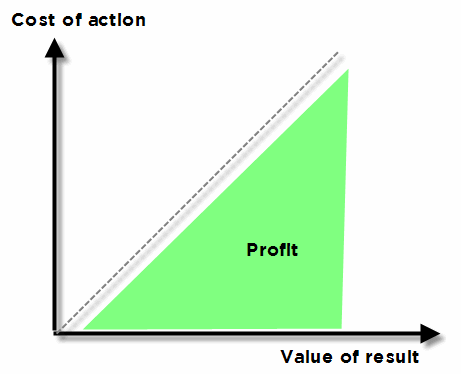It's true. The funnel metaphor is very tired. It comes up in so many different ways, and it's not all that instructive.
His comment also reminded me that the language we use to describe advertising strategies is very cold. It's no surprise that people have soured on the advertising business over the years. Who wants to be targeted? Who wants to convert? Who wants to be squeezed through a funnel? (That would have been particularly difficult a couple of months ago when I somehow got addicted to eating large Rice Krispy treats every afternoon.)
Marketing should not be about herding people. It should be about creating opportunity for people.
How does that work in practice? I don't have a good answer. Marketing lingo is very efficient for understanding macro views of markets, but one slide started to open up this thought process for me:

In this case, I'm talking about the ROI a person wants to get from committing to some action such as a click or filling out a form. If the cost of doing something is less than the value of the result of the action, then the person committing the action will feel fulfilled.
You can get people to do expensive things, but you can't expect them to take a loss on the exchange.
Erik owes me a cookie.
Trackbacks:
TrackBack URL:
http://www.mattmcalister.com/blog/_trackback/1808045
| How niche publishers will capture more share of online advertising revenue | |
| Weblog: | Matt McAlister |
| Excerpt: | Scott Karp of Atlantic Monthly posed the right question with his post on the search advertising market share imbalance:"Will advertisers start to question the ROI of all the money they’ve dumped into search advertising?"Click fraud is a serious probl... |
| Posted: | Fri Mar 10 13:30:08 EST 2006 |
